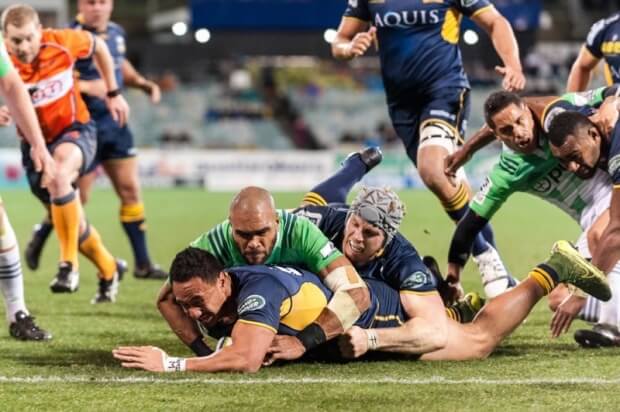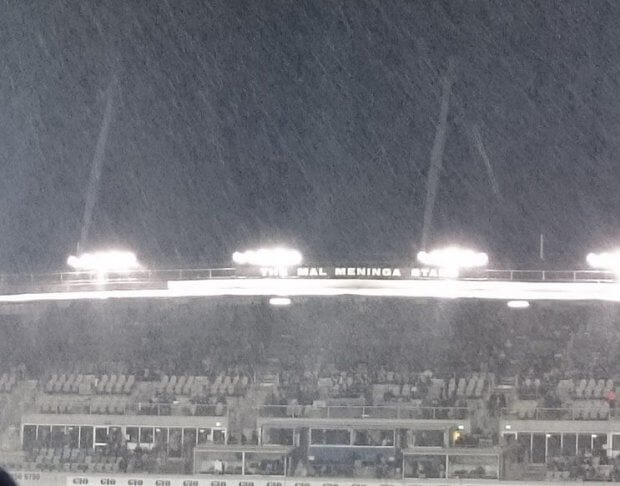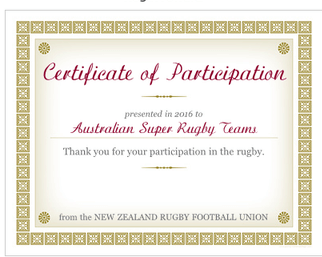Well, that’s all folks!
The season is done; the Brumbies at least made the finals but were knocked out in the first round.
So where does that leave us? Our very good Kiwi (faux) friend Dismal Pillock had graciously facilitated the delivery of the below certificate to Aussie Rugby.
Sad, as it seems deserved and just when you think that it can’t get worse than the Kiwis giving us more stick, nek minute, I am hearing reports that the SARU have put theirs in the mail after the Lions made the last four.
Based on points, the Brumbies were 7th on the table, on the same points as the Sharks but with one win more, and a solitary point above the Bulls.
Four of the Australian teams finishing in the bottom 10 teams signifies a pretty poor year for Aussie teams overall.
Try or no try?
Good, bad or otherwise, it was again a feature of a Super rugby game.
Is it time for a review of the TMO system?
It’s interesting when you consider that in making a decision the TMO is required to use the “clear and obvious criteria”, which is logical and sound.

In making a decision the TMO can only rule if it’s clear and obvious. Sticking to the letter of the law, the question asked in regards to the Brumbies try was, “try or no try?” Immediately, as there was no “clear and obvious “ vision to support any decision conclusively should the TMO be compelled to only advise that he cannot make a decision otherwise he is in effect be influencing the outcome.
You also have to ask the question if there is no “clear and obvious” vision to award the try, how can the same vision be use to disallow a try? On Friday night the TMO could not see grounding so how could he see of it was held up or short?
Although seeming pedantic, the laws are clear to avoid opinion and potential bias to one of the teams.
Should we adopt a similar system to the NRL, pushing the decisions back to the referees on the field to make a decision before it can be referred to the TMO. The TMO is then used to validate or over rule a decision, maintaining the “clear and obvious criteria”. The exception would be for foul play and the like where the vision need to be reviewed to form a decision.
The other issue is how the benefit of doubt is applied in relation to tries. In most other parts of the game the team going forward is rewarded, Should this also apply when tries are being reviewed with the benefit of the doubt going to the team going forward?
Lions, the new face of South African rugby.
The Lions have certainly made their mark in this year Super Rugby competition, and also in South African Rugby. Playing a game plan and style that does not fit in to the traditional Saffa mould, they are forging a new brand of rugby for other South African teams to follow.
Watching their games you can start to draw comparisons to Kiwi teams. The pace, offloads, as well as the attacking intent is a refreshing change to what we have seen in the past from the South African teams.
Their performances this year have justified their place in the semi-finals, with wins against Kiwi teams away from home they have showed that it’s not by fluke. Elton Janties has been a key reason behind the Lions success and has also shown the he can deliver for the Springboks. Also emerging in the Lions teams are some potential Springbok bolters such as Rohan Janse Van Rensburg who showed on the weekend that he is a nightmare for any defence with multiple tacklers struggling to slow him, let alone stop him.
The Rugby Championship will make for interesting viewing as based on Super Rugby form!
The Conference System … shifting opinions?
After the first weekend of finals under the new conference system there were few surprises in terms of results. But in the lead up to the finals there was some talk of the conference system being unfair.
So let’s take a look.
Some from across the ditch were calling foul because the Brumbies had a home final even though they had equal fewest points out of the 8, level with the Sharks. But in the end, that didn’t do them any good, home ground advantage wasn’t enough to help them go any further in the comp.
Also some are saying that there were teams in the finals that didn’t deserve to be there, however when you look at the points each team had at the end of the regular season, it was the top 8 teams that went on to the finals. So the Sharks getting the automatic South African Wild Card was fair enough, in terms of points.
But the one thing that people have been seriously querying throughout the season was the un-evenness in terms of who played who during the season.
Case in point … The Stormers. They finished the season on top of their conference, earning an automatic home final. They finished the season with 51 points, only 2 points behind the Hurricanes. On paper, it looks like they well and truly deserved to be there, and their results during the season backed it up.
But then we look at who they played. Bulls twice, Cheetahs twice, Sunwolves twice, Sharks, Brumbies, Jaguares, Lions, Reds, Waratahs, Rebels, Force, Kings. Only 3 of those teams went on to make the finals.
Compare this to the Highlanders, who finished on 52 points, just 1 point clear and got through to the finals on a Wild Card, missing out on a home final. Hurricanes twice, Chiefs twice, Blues, Lions, Waratahs, Rebels, Force, Reds, Sharks, Brumbies, Crusaders, Kings, Jaguares. 8 matches against teams that ended up making the finals.
On paper at least, one of those draws appears easier than the other.
The first time The Stormers faced a New Zealand team, undoubtedly the strongest teams in the competition, was in the Quarter Final against the Chiefs. And they were well and truly beaten. Did the lack of kiwi competition during the season not prepare them for what they would come up against? Did they play weaker teams during the season, giving them a false measure on the level of the competition?
Since early Sunday morning Schalk Burger and Stormers coach Robbie Fleck have criticised the current format, with Fleck saying that not having faced a kiwi team this year was a big factor in the loss. Burger went on record as giving preference to a round robin format where all teams play each other.
“It would be nice to see the round robin system back again; you want top see all the teams taking on each other and as a player you want to have that experience of pitting yourself up against all the best players and teams plus the travel experience,” said Springbok flanker Burger.
“The conference system is far too complicated, there aren’t many who even understand it.” (http://www.rugby.com.au/news/2016/07/25/01/44/fleck-on-super-rugby-format)
But it appears that the conference system is here to stay. It will be interesting to see if SANZAAR listen to those such as Burger and Fleck, and if there are any changes made for the coming years.
Super Rugby Semi Finals
We have reached the penultimate round of Super Rugby 2016 and it is down to three Kiwi teams, the Chiefs, Hurricanes and Highlanders, and a solitary South African team, the Lions.
The Lions are writing their history with every game, only reaching the semi-final’s in their previous incarnation as the Cats in 2000 and 2001 (as a side note, in Round 2, 2001 the Cats beat the Highlanders 56-21 at Ellis Park).
The Hurricanes will be looking to avenge last year’s loss in the finals and win their first title, while the Highlanders will want to defend their title.
The Chiefs will be looking to spoil everyone’s party and become a three time winner.
Predicating a winner in these game could be challenging, and the potential for a drawn result at the end of regular time is a real possibility. Should it be all square at the end of 80 minutes here is how the results will be decided:
Tiebreaking Protocol
If the teams are tied at full-time in any Finals Series Match then the following will apply until a winner is found:
• After a five minute rest period, the extra time is played in two 10 minute periods with a two minute halftime;
• Before the extra time begins, the match referee will do a coin toss with the two captains one minute before the new kick-off. The winner of the coin toss decides if his team wants to kick-off or if his team wants to choose the side of the pitch it wants to play on for the first 10 minute period;
• For the second 10 minute period, the teams change sides and the team that did not kick off in the first period does so;
• Coaches are not permitted on the field during the rest period or halftime.
Sudden Death – if the match is still drawn at the end of extra time, the procedure will be:
• An up to 10 minute sudden death period is played after another five minute rest period;
• The first team to score (by a penalty, drop-goal or try) will be the winner;
• As for extra time, one minute before sudden death begins, the match referee will do a coin toss to choose which team kicks-off and on which
Make sure you look out for the semi-finals previews and match reports!



